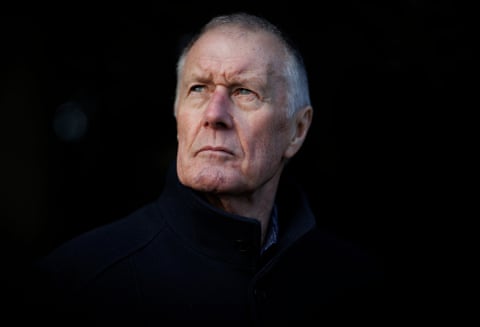“Life is such a lottery,” Sir Geoff Hurst says as his face creases with emotion on a cold, sunlit morning full of moving revelations and surprising insights. Far beyond 1966, when he scored his famous hat-trick which helped England win the World Cup, Hurst considers a hard truth. “We lost our eldest daughter, Claire, to a brain tumour. How do you cope with that?”
There is a pause as, at home in Cheltenham, Hurst looks down. He turns 80 on 8 December but strength and serenity allow him to peel away the mythology of ‘66 and show how his true self has been shaped by glory and tragedy, fame and normality. Hurst nods and looks up again. “It’s something you have to cope with because life moves on.”
As he enters his ninth decade he can reflect on good fortune and devastating loss with equanimity. Hurst reminds me that he did not play for England until the very year he became the first – and still only – footballer in history to score three goals in a men’s World Cup final. During the tournament, it was only in the quarter-final that Hurst replaced the injured Jimmy Greaves, a footballer whom he revered when they were kids and young pros in Essex. Their lives changed in contrasting ways and he made the most of his unexpected opportunity and played 49 times for England, scoring 24 goals. Hurst also scored 210 goals in over 500 games for West Ham and Stoke City.
Hurst has always been more than a footballer. He tells me, wryly, about the one county cricket match he played for Essex, alongside the great Jim Laker, in 1962. “It was against Lancashire, in Aigburth in Liverpool, and I got nought and nought not out.”
He managed Chelsea from 1979 to 1981, and tried to sign Johan Cruyff and Kevin Keegan before he was sacked. He was fleeced by conmen and ended up on the dole. Hurst kept going and built a new life in insurance. He laughs now at the small humiliations he suffered as a rookie door-to-door salesman derided by many as a lowly ex-footballer and doubted by others who could not believe “the” Geoff Hurst sold insurance.
Memories of his younger brother, Robert, who took his own life in 1974, returned again and again. And then, when Claire was diagnosed with cancer while pregnant, Geoff and his wife, Judith, cried together on their kitchen floor. But Claire lived another 10 years – until December 2010.
Early December, with this terrible anniversary and Christmas approaching, is always a time of tangled reflection. “Issues like health are a lottery,” Hurst continues. “Judith goes to the cemetery to change the flowers on Claire’s grave and when she comes back she always remarks that she looked at the tombstones. She is astounded by the amount of young people [who died].”
Judith might find comfort in feeling close to Claire again but Hurst shakes his head when I ask if he visits the graveside. “No, it’s the opposite for me. I can’t face it.”
He and Judith married “on 13 October 1964 and we were together a couple of years prior to that. We have been amazingly happy.”
Considering all the heartache they shared, did he ever lose faith in life? “I don’t think so. For a long time I didn’t want to talk about anything relating to the family in public. But I had three daughters and my eldest, Claire, passed away 11 years ago now. At Christmas in 2010. I found it difficult to talk about for a long time.”
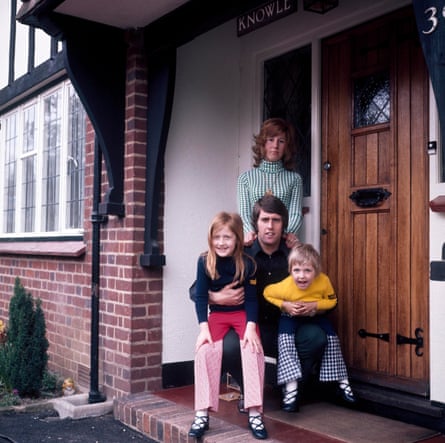
Hurst now believes that “trying to hide heartache merely leads to more grief”. After 80 years studded with extreme highs and lows he says: “Life’s got to go on. But you never cease to remember. You never cease to mourn. We talk about what she was like and the things she said and did. The pictures of her in our apartment here are great memories.”
I break the silence by suggesting that such memories sustain us. It sounds trite but Hurst smiles kindly. “They do, yes.”
Another memory relates to the death of his brother, Robert, and it has stayed with me all week. Robert took his own life, Hurst explains, “during one of his dark depressions which, thankfully, never engulfed me”. He adds that “Robert was four years younger than me and he sadly threw himself under a train at Chelmsford station in 1974.”
He remembers that eight years later, after the Chelsea sacking and a brief period relying on unemployment benefits, “I was doing some punditry and covering games in East Anglia – Norwich, Ipswich, Peterborough and Cambridge. I’d probably get £60 for the weekend, which was hardly going to keep me and the family in comfort.
“In early 1982 I’m coming back on the train from Norwich and that line actually goes through Chelmsford into Liverpool Street. It was a Sunday and very few people were on the train. I was in a carriage on my own and there was no canteen. The ticket collector asked if I would like a cup of tea. I said: ‘That’s very nice of you. Thank you.’ It was quite surprising from a conductor.”
Hurst could savour a cup of tea as being one of the rare perks, at least then, of being a World Cup winner. He would soon hear a shattering truth.
“He came back in five minutes and said: ‘There’s your tea, Geoff.’ But he also said: ‘I was working on the train that day your brother jumped in front of it all those years ago.”
Hurst pauses as he relives that jolting moment. “I was flattered he had brought me a cup of tea. But I saw afterwards, when he mentioned his connection with my brother, it was something fairly significant in his life as a conductor.”
Making him tea and sitting down to talk, I suggest, was also a very human gesture.
“Very much so,” Hurst says softly.
It is only since 1996 that the exploits of Hurst and his World Cup-winning team have become a cause for sustained national celebration. When England won in 1966 the euphoria was limited and life soon returned to normal. Yet when Euro 96 was held in England, millions of people sang that “football’s coming home” and about “30 years of hurt”. The song and the sentimentality were back again this past summer as England lost the final of Euro 2020 on penalties.
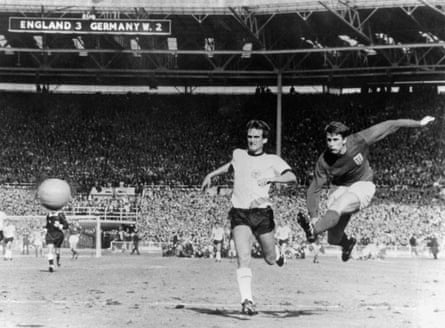
All the singing of hurt, over football, seems different when you’re talking to Hurst. It feels inconsequential when set against the life-changing pain he withstood. Hurst answers calmly when asked if he ever succumbed to bitterness. “Not at all. I learned you need a good attitude in football and in life. I certainly wasn’t the world’s greatest player but I had a very good attitude.
“After football I went into insurance and I was getting knock-backs there. I’ve got some funny stories about my early days trying to sell warranty insurance to car dealerships. I went into a Ford dealership, without an appointment, and saw the secretary. I gave her my card and said: ‘We haven’t got an appointment but could I see the boss?’ She went into his office, gave him my card, and he came out in five minutes and slung the card at me. It bounced off the table on to the floor and he said: ‘We don’t deal with ex-footballers.’”
Hurst tells me more stories of rejection which are “clear as a bell. Going into the insurance business, Abbey Life had a good induction programme. One of the lessons was making appointments with people over the phone. You picked up a phonebook, randomly picked a few names and tried to make appointments with them. I phoned one number and a woman answered. I said: ‘I’m Geoff Hurst at Abbey Life.’ I went through the standard procedure and she said: ‘I’m sorry but my husband deals with this.’ The husband came to the phone and said: ‘If you’re Geoff Hurst, my name’s f-ing Marilyn Monroe.’
“I look back on these times with great amusement and amazement. In the early days I would practise on Judith. I would go through the garage and knock on the kitchen door. Judith would open it and I’d talk to her about selling insurance. She’d slam the door and say: ‘Go away.’ But she kept me grounded and that’s very important in a relationship.”
Hurst is in the mood to compare life and sport, then and now, because his new book is called Eighty at Eighty. It is a celebration of the 80 sportsmen Hurst has most admired and the list stretches from Muhammad Ali, Rod Laver and Lionel Messi to Pelé, Garry Sobers and Zinedine Zidane.
It’s an enjoyable read and full of personal snippets – from the state of Jim Laker’s spinning fingers when Hurst played that game at Aigburth to Ali being at the 1966 World Cup final. Hurst writes in the opening chapter of his alphabetical romp through 80 sporting stories that Ali “would still have been my No 1 choice” even if he had listed them “in order of greatness”.
Ali was less enamoured by football and Hurst confirms that The Greatest slept through most of England’s 4-2 extra-time defeat of West Germany. In a very different way he and Judith reached a stage where they were “reluctant to go out because we knew at some point a complete stranger would ask the dreaded ‘Was the ball over the line?’ question.”
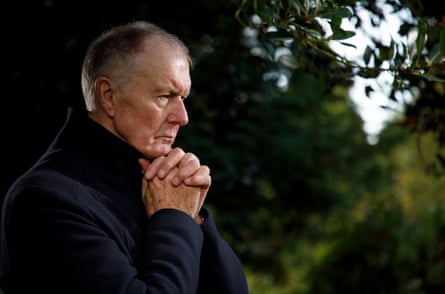
He always gave his stock answer that the score had changed from 2-2 to 3-2 “so it must have been a goal” – while he believed in the reaction of the “always honest and fair” Roger Hunt who wheeled away in celebration and certainty that Hurst’s shot had crossed the line.
“People ask me: ‘Do you get fed up talking about it?’” Hurst says of 1966. “The simple answer is ‘No’. It’s part and parcel of my life.”
He talks passionately about Bobby Moore and Martin Peters – and the book is dedicated to them. Even though he and Moore were close, his captain remained an enigma. “Nobody knew the real Bobby Moore,” Hurst suggests but his admiration for the “cool and dignified” footballer who was “one of the greatest defenders the world has ever seen” resonates. Why did Moore seem unknowable?
“I don’t know,” replies Hurst who even played cricket with Moore for Essex’s second XI. “It’s difficult to describe. People ask me who my idol is and normally you’d be thinking of somebody who played 20 years earlier. My idol, Bobby Moore, was eight months older than me. I grew up with him since we were 15 and saw how he progressed much quicker than me. He was a senior player for West Ham and England four years earlier than I made the first team. But we were good mates and I loved him. He was fantastic, a great leader and an immaculate man.”
Hurst is angry that football “turned its back on Bobby” which meant that Moore became “a sideshow … forced to scratch a living on the periphery”. He compares “the sickening hypocrisy” of the statues, books and documentaries which followed Moore’s death to the way in which German football has celebrated and utilised the talents of Franz Beckenbauer.
“In this country,” Hurst says, “many players who had been at the top level, big names, found it hard to get back into their clubs after finishing. I was once an ambassador for a double glazing company which sponsored West Ham and I was refused entrance into the main gate to Upton Park one night. The girl who stopped me looked 10 yards behind me to the commercial manager, to get some kind of authority to let me in. He just shook his head. That wasn’t unusual. Lots of other great players talked to me about the fact they couldn’t get into their club after they finished. Of course it’s changed massively now.”
His closest friend was Peters – who also scored a goal in the 1966 final and was such a visionary player that Alf Ramsey described him as being “10 years ahead of his time”. He and Peters also worked together in insurance and their wives, Judith and Kathy, remain friends after almost 60 years. Peters, who died in December 2019, had Alzheimer’s disease.
“We were so close to Martin. When we both got married in 1964, I paid £5,050 for my house in Hornchurch. Martin paid £4,950 for his house. His garden backed on to my garden. Martin wasn’t well one Christmas so Judith cooked and passed the plates of dinner over to Kathy to feed him. Kathy and Judith still speak every day, sometimes three times a day. We were as close to a family living with dementia as anyone could possibly be. The Alzheimer’s just accelerated.”
Were the last few months of Peters’ life particularly painful for Hurst? “Very. Listening to the girls talking every day was a commentary of this awful disease. It was bitterly disappointing for Kathy, her family and for us.”
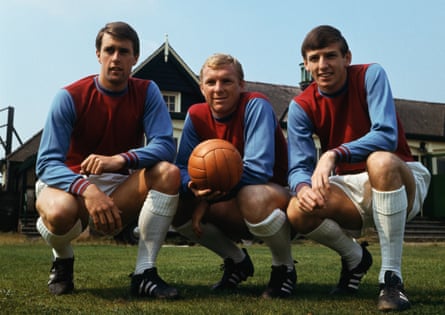
Bobby Charlton was diagnosed with dementia last November. “We haven’t spoken to him for a while,” Hurst says. “I began to get concerned when we didn’t see Bobby on television. Normally at all the Man United games they would show him in the crowd but for a few months prior to the announcement there was no mention or picture of Bobby. I guessed then.”
So many of their teammates have succumbed to dementia or Alzheimer’s and, while Hurst remains mentally sharp, does Judith worry about him? “I don’t think she’s overly concerned. She does joke and laugh at me sometimes when I make the odd mistake as an old person. But that’s normal.”
Hurst, Charlton and George Cohen are the only surviving members of the 1966 team. “I see George occasionally,” Hurst says. “I always joke about George that he should be dead but I spoke to him only a few weeks ago. He had bowel cancer not long after he was playing and it then came back again. It was so serious that they were asked to see the specialist and he said: ‘You’d better get your affairs in order.’ Daphne [Cohen’s wife] said: ‘George is going nowhere.’
“Of course, she nursed him through that. He’s on crutches now but mentally he is fine. I spoke to both him and Daphne and it reminded me George was the nicest guy in the team. When people bump into George they always tell me the same thing: ‘What a lovely man he is.’”
Just days from his 80th birthday Hurst says: “I’m still trying to keep fit and enjoy life. I walk in the park for 50 minutes and do 20 minutes of a Joe Wicks video. I made sure I did it early this morning so I could fit you in. I have a pacemaker but it’s not a big deal and I had my six-weekly check-up last week. Everything is OK.”
Hurst tells me about his youngest granddaughter who is only four. “Rose is absolutely hilarious. I went round the other day and at the table she said: ‘Geoff, I love you.’ Everybody just screamed with laughter at her calling me Geoff from nowhere.”
It’s easy to drop the “Sir” and just call him Geoff too because Hurst is so warm and likable. He hopes England might win a second World Cup next December. “They’re doing very well as a World Cup semi-final and Euros final the last few years shows. They’re a good, terrific bunch of young players under Gareth Southgate and luckily we’ve forgotten the really awful times. Remember the Iceland game? Goodness me, that was shocking. So I’m hopeful for next year. People say: ‘I bet you don’t want England to do it again’ but that’s rubbish. I’m an England fan so I hope we can do it.”
Hurst admits that his family love the fact that he holds the record as the only footballer to have scored a men’s World Cup final hat-trick. “I’ve got five grandchildren and the second eldest is Jack, who is the son of Claire. Jack is now 30-odd. In the 1998 World Cup final Zidane had scored two and then he was substituted. As soon as he walked off the field, within seconds, I had a text from Jack: ‘Grandpa, great, you’ve still got the record.’”
Hurst laughs again even as we think of that lost time when Claire was still alive. He leans back in his chair and, remembering how there has been so much more good than bad in his own life, Hurst smiles and says: “I’ve had a very good run … I’ve had a fantastic run.”
Eighty at Eighty by Sir Geoff Hurst is published by Pitch
